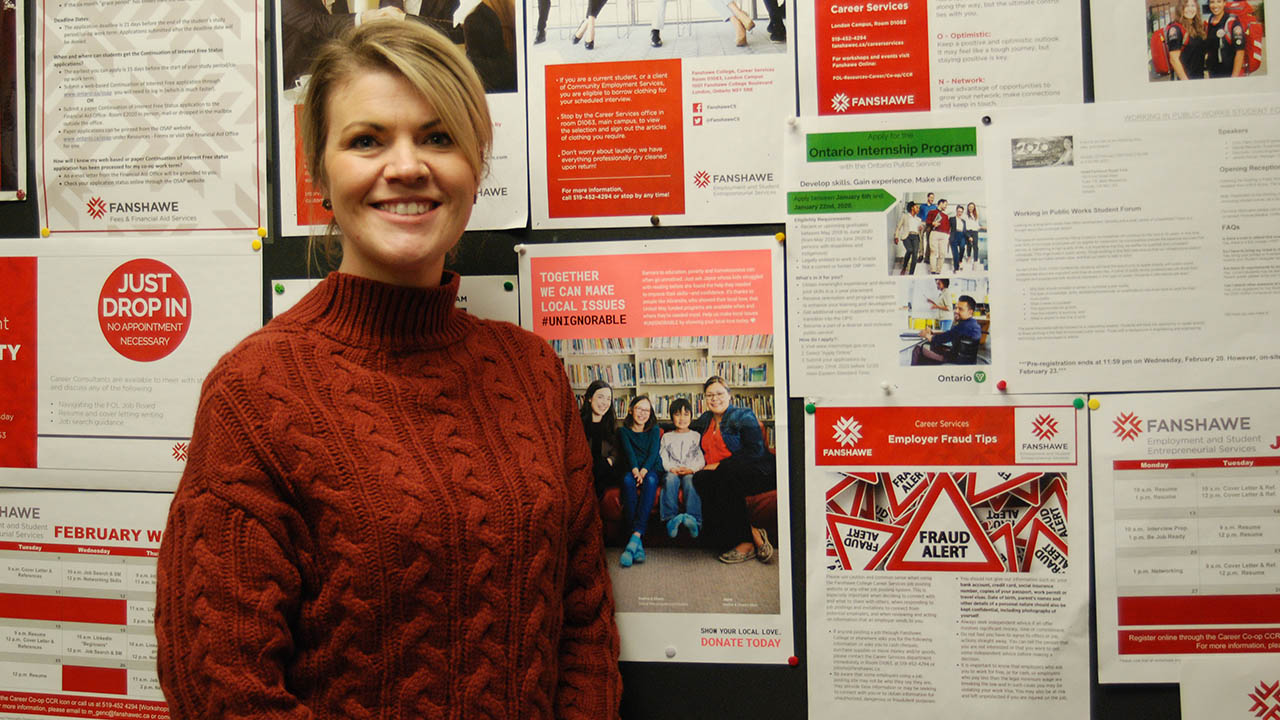Staying safe before, during, and after the job hunt
 CREDIT: EMILY STEWART
CREDIT: EMILY STEWARTLaurel Teall, a career services consultant at Fanshawe College, said that researching employers, watching for red flags pointing to employer fraud, and knowing your health and safety rights as a worker will ensure you stay safe in the workforce.
Whether you work at a restaurant, in an office, or on stage, you always have the right to be safe at work.
The Workplace Safety and Insurance Board’s (WSIB) By the Numbers: 2018 Statistical report revealed there were 254,000 registered claims in Ontario in 2018. Nearly half of the allowed losttime injury claims, at 47 per cent, were related to sprains and strains, 17 per cent tied to overexertion, and 15 per cent related to a lower back injury.
Laurel Teall, a Fanshawe career services consultant, said all employees are protected by Ontario’s Health and Safety laws. Workers have the right to feel emotionally and physically safe, to access workplace safety training, and to be treated fairly. That includes the right to refuse unsafe work. There would be some more in-depth health and safety training specific to different jobs and industries.
“There’s lots of different things that they should know,” Teall said. “I think that having industry-specific knowledge is very important when starting to job search.”
She added that Career Services has seen a rise in students getting involved with fraudulent job postings. When searching for a job, students should also be on the lookout for such postings and watch for several red flags.
An immediate ask for personal information like banking during the job search process is a huge red flag. Job hunters should also watch out for employers who offer you money to purchase a computer to work from home and if offered, should not accept it.
“An employer would never send you a cash advance to go buy a computer to work from home.”
Red flags also include being offered a job without applying for it and/or receiving a job offer that has nothing to do with your experience or skill set. Job postings that offer a higher pay rate for a job that typically pays minimum wage is also a warning sign.
Job searchers should watch for unprofessional language and inconsistency in emails, along with messages from a Gmail address on behalf of a company — although, Teall noted, it’s not always the case if someone is self-employed. Sometimes, people who create fraudulent job postings will search a company and a human resources (HR) specialist on LinkedIn and then shape their profile to pose as a legitimate employer.
“If you did a quick search on LinkedIn and you think ‘Oh, it is the HR person,’” said Teall. “If you don’t know other signs to look out for, sometimes people can fall for it.”
A student recognizing an unsafe work situation should first discuss it with their employer. An employee can file a complaint with the Ontario Labour Board if their employer is making them feel unsafe.
Career Services can also help students prepare a health and safety conversation with their employer, but students should know they have the right to refuse safe work.
“Maybe they’re already working part-time or with an employer where they’re wondering ‘Is this allowed or is it not?’” Teall said. “We’re always happy to meet with them and talk about it and give them some tools and some words that they can use to really effectively approach their employer, but it’s good to know that if you’re going to challenge a health and safety practice or if you have a concern, you can’t be fired because you raise a health and safety concern.”
That includes situations regarding your mental health, as new workplace policies are put in place while mental health awareness increases. Teall said that along with employee wellness programs and accommodations for mental health, there are laws put in place surrounding workplace bullying.
Visit Career Services in room D1063 for workshops, resume writing, interview preparation, and knowing your rights as a worker.















